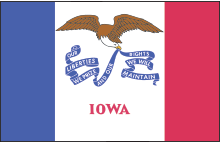Updated: 8/2013
Status: Possibly Permitted
Statute
 Section 123.144 indicates bottling of beer for home consumption is permitted. The statute was amended in 2013 to specifically allow for beer bottled for personal use to be removed from premises where it was bottled for personal use, so long as it is not offered for sale or exchanged for any consideration. Presumably that means that home manufactured beer that would be bottled “for personal use” is also legal. Home win making for personal use is specifically permitted by section 123.56.
Section 123.144 indicates bottling of beer for home consumption is permitted. The statute was amended in 2013 to specifically allow for beer bottled for personal use to be removed from premises where it was bottled for personal use, so long as it is not offered for sale or exchanged for any consideration. Presumably that means that home manufactured beer that would be bottled “for personal use” is also legal. Home win making for personal use is specifically permitted by section 123.56.
Section 123.56 expressly allows for individuals to produce wine for home consumption.
Discussion
Language explicitly stating the production of beer at home for personal use is permitted is still absent from the statute, but 123.144.2 allows for the bottling of beer for personal use. It also allows for the removal of beer bottled for personal use from the premises where it was made, so long as it is not sold. Note that “beer is defined as having no more than five percent alcohol by weight. Section 123.144 does not reference “high alcoholic content beer,” which is defined as beer containing more than five percent alcohol by weight and not more than twelve percent alcohol by weight.
Manufacture of wine for personal use is allowed so long as it is consumed on the premises where it was made and not offered for sale. However there is no provision authorizing the removal of such wine from the premises where it was made.
State Alcohol Beverage Control Agency
- 1918 S.E. Hulsizer Ave.
- Ankeny, IA 50021
- Phone: 515.281.7430
- Fax: 515.281.7372
Applicable Statutory Material
§ 123.2. General prohibition
It is unlawful to manufacture for sale, sell, offer or keep for sale, possess, or transport alcoholic liquor, wine, or beer except upon the terms, conditions, limitations, and restrictions enumerated in this chapter.
§ 123.3. Definitions
As used in this chapter, unless the context otherwise requires:
7. “Beer” means any liquid capable of being used for beverage purposes made by the fermentation of an infusion in potable water of barley, malt, and hops, with or without unmalted grains or decorticated and degerminated grains or made by the fermentation of or by distillation of the fermented products of fruit, fruit extracts, or other agricultural products, containing more than one-half of one percent of alcohol by volume but not more than five percent of alcohol by weight but not including mixed drinks or cocktails mixed on the premises.
19. “High alcoholic content beer” means beer which contains more than five percent of alcohol by weight, but not more than twelve percent of alcohol by weight, that is made by the fermentation of an infusion in potable water of barley, malt, and hops, with or without unmalted grains or decorticated and degerminated grains. Not more than one and five-tenths percent of the volume of a “high alcoholic content beer” may consist of alcohol derived from added flavors and other nonbeverage ingredients containing alcohol. The added flavors and other nonbeverage ingredients may not include added caffeine or other added stimulants including but not limited to guarana, ginseng, and taurine.
30. “Nativewine” means wine manufactured pursuant to section 123.56 by a manufacturer of native wine.
37. “Wine” means any beverage containing more than five percent but not more than seventeen percent of alcohol by weight obtained by the fermentation of the natural sugar contents of fruits or other agricultural products but excluding any product containing alcohol derived from malt or by the distillation process from grain, cereal, molasses or cactus.
§ 123.56. Native wines
1. Subject to rules of the division, manufacturers of native wines from grapes, cherries, other fruits or other fruit juices, vegetables, vegetable juices, dandelions, clover, honey, or any combination of these ingredients, holding a class “A” wine permit as required by this chapter, may sell, keep, or offer for sale and deliver the wine. Sales may be made at retail for off- premises consumption when sold on the premises of the manufacturer, or in a retail establishment operated by the manufacturer which is no closer than five miles from an existing native winery. Sales may also be made to class “A” or retail wine permittees or liquor control licensees as authorized by the class “A” wine permit.
2. A manufacturer of native wines shall not sell the wines other than as permitted in this chapter and shall not allow wine sold to be consumed upon the premises of the manufacturer. However, prior to sale native wines may be sampled on the premises where made, when no charge is made for the sampling. A person may manufacture native wine for consumption on the manufacturer’ premises, when the wine or any part of it is not manufactured for sale.
§ 123.144. Bottling Beer
2. However, any person of legal age may bottle beer for personal use and if it not sold or offered in exchange for any type of consideration. In addition, such beer may be removed from the premises where it was bottle for personal use if the beer is not sold or offered in exchange for any type of consideration.
Note: The information presented here is to the best of our knowledge and should not be used as a substitute for legal advice specific to the laws of your state.

Share Post